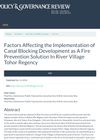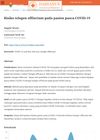 5 citations,
January 2021 in “Dermatology Online Journal”
5 citations,
January 2021 in “Dermatology Online Journal” An 84-year-old man developed a rare scalp condition from a cancer drug but continued treatment as it was otherwise well tolerated.
 1 citations,
January 2023 in “Revista Da Associacao Medica Brasileira”
1 citations,
January 2023 in “Revista Da Associacao Medica Brasileira” People with seborrheic dermatitis often have lower vitamin D levels.
 1 citations,
December 2022 in “PubMed”
1 citations,
December 2022 in “PubMed” COVID-19 may cause temporary hair loss, which usually gets better on its own, but reducing stress and managing health issues might help recovery.
[object Object]  1 citations,
March 2018 in “Policy and governance review”
1 citations,
March 2018 in “Policy and governance review” Canal blocking development for fire prevention in Sungai Tohor is influenced by government rules, community involvement, public awareness, and local knowledge.
 1 citations,
January 2018 in “Medical Science and Discovery”
1 citations,
January 2018 in “Medical Science and Discovery” The document's conclusion cannot be provided as the content is not available for parsing.

Biotin does not significantly help with hair growth.
 May 2024 in “Research Journal of Pharmacy and Technology”
May 2024 in “Research Journal of Pharmacy and Technology” New, simple, and cost-effective methods can accurately measure Minoxidil in medicines.
 March 2024 in “International journal of research in medical sciences”
March 2024 in “International journal of research in medical sciences” Dr. SKS hair booster serum effectively treats hair loss caused by COVID-19.

Many severe COVID-19 patients experienced temporary hair loss, but most regrew hair within six months.
 February 2024 in “PubMed”
February 2024 in “PubMed” More people experience hair loss after recovering from COVID-19 in hospitals than in outpatient settings.
 December 2023 in “Damianus Journal of Medicine”
December 2023 in “Damianus Journal of Medicine” Post-COVID-19 patients are at risk for hair loss.

COVID-19 infection is highly related to increased hair loss, especially in women.
 June 2023 in “Journal of General Procedural Dermatology and Venereology Indonesia”
June 2023 in “Journal of General Procedural Dermatology and Venereology Indonesia” Older, overweight women with children and a family history of hair loss are more likely to experience female pattern hair loss.
 October 2022 in “Research, Society and Development”
October 2022 in “Research, Society and Development” Hair loss is a symptom of long COVID and can be treated with a protein-rich diet.

COVID-19 can cause hair loss and nail issues, with treatments available for these conditions.
 September 2022 in “Canadian journal of animal science”
September 2022 in “Canadian journal of animal science” Certain gene variations are linked to the thickness of cashmere goat hair.
 June 2022 in “Research, Society and Development”
June 2022 in “Research, Society and Development” COVID-19 may cause increased hair loss, but the exact reason is unclear and standard hair loss treatments are recommended.
May 2022 in “Brazilian Journal of Health Review” COVID-19 infection can cause temporary hair loss due to stress, treatment drugs, psychological impact, and pandemic-related stress.
[object Object]  May 2021 in “Клітинна та органна трансплантологія”
May 2021 in “Клітинна та органна трансплантологія” Skin aging can be slowed down with proper care and treatments.
 January 2021 in “Turkiye Klinikleri Journal of Dermatology”
January 2021 in “Turkiye Klinikleri Journal of Dermatology” Women with a certain type of hair loss had lower levels of a hormone called prolactin compared to healthy women.
 August 2020 in “Ugeskrift for Læger”
August 2020 in “Ugeskrift for Læger” A man with severe hair loss regrew all his hair using tofacitinib and stayed healthy for a year.
 August 2015 in “Journal of clinical & experimental dermatology research”
August 2015 in “Journal of clinical & experimental dermatology research” Mesotherapy and PRP are increasingly used for hair loss treatment but lack extensive research on their effectiveness.
April 2010 in “The journal of immunology/The Journal of immunology” FoxN1 gene is crucial for proper thymus structure and normal skin appearance.
 September 2001 in “PubMed”
September 2001 in “PubMed” The new X-ray technique allows for precise and non-destructive measurement of elements in hair, creating the first database of its kind for a specific ethnic group.
294 citations,
March 2016 in “European journal of cancer” Neoadjuvant chemotherapy followed by surgery leads to fewer severe complications and better quality of life than immediate surgery in advanced ovarian cancer patients with high tumor load.
222 citations,
January 2003 in “Critical Reviews in Therapeutic Drug Carrier Systems” Ethosomes can safely and effectively deliver various drugs deep into the skin.
153 citations,
June 2015 in “GenomeBiology.com” The environment around the time of conception can change the VTRNA2-1 gene in a way that lasts for years and may affect disease risk.
 101 citations,
May 2014 in “PLOS ONE”
101 citations,
May 2014 in “PLOS ONE” Women with PCOS have a higher chance of experiencing depression, anxiety, and sleep disorders.
 90 citations,
May 2019 in “Drugs”
90 citations,
May 2019 in “Drugs” Long-term use of azole antifungals can cause hair loss, hormonal imbalances, and severe skin reactions.
88 citations,
August 2019 in “Frontiers in immunology” Tyrosine kinases are important in skin autoimmune diseases and could be targets for new treatments.
























